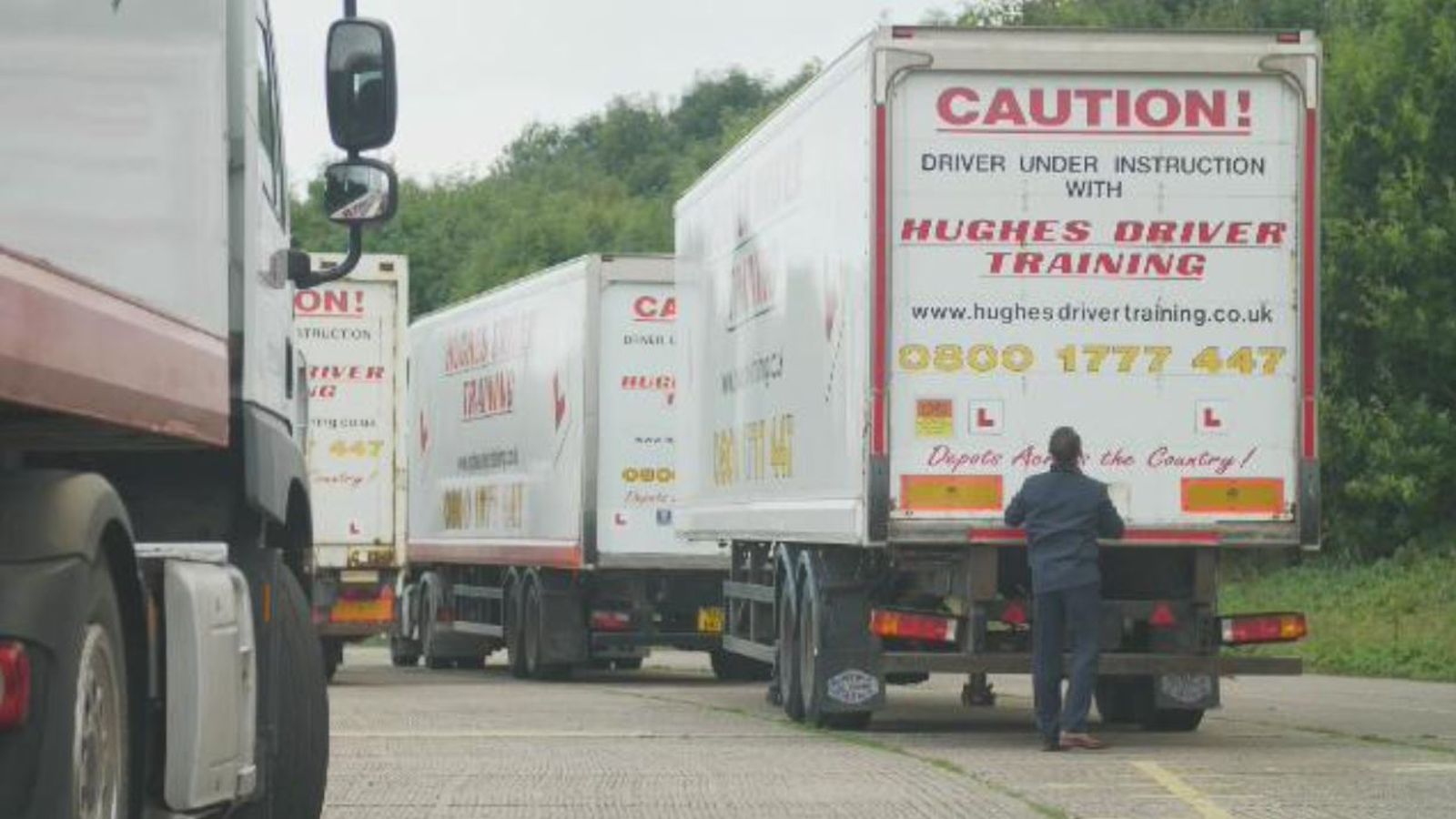Rising wages and huge demand for HGV drivers has led to unprecedented numbers of people seeking training for licences, according to Britain’s largest private driver training company.
Hughes Driver Training, based in Leicestershire, told Sky News it’s sending around 100 for HGV Class I and II testing per week, including many sent directly by haulage firms seeking to fast-track applicants.
Demand for drivers has seen major employers including Tesco, Amazon and John Lewis, offering four-figure ‘joining bonuses’ to drivers, fuelling rapid wage inflation.
“I think it’s going through the roof,” said managing director Carl Hughes.
“There are drivers I know that are working for companies and have been there for years, they’ve had two or three pay rises this year without even asking for it, because it’s had to adjust to supply and demand.
“There are people, newly-qualified drivers who are on over £35,000 a year now at some companies and they’re getting a signing-on bonus as well. It’s really good for them.”
Major high street chains McDonald’s, KFC and Nando’s have been forced to cut menu items or close restaurants in recent weeks because of supply problems, and manufacturers and non-food retailers have also warned that the logistics crisis could deepen in the run-up to Christmas.
A shortage of an estimated 100,000 HGV drivers is at the heart of a growing supply chain crisis that business leaders and economists warn may be slowing the UK’s post-pandemic recovery.
Almost half of those have left the industry in the last two years, a trend blamed on long hours, low esteem and wages that had been falling relative to other low-skilled jobs, accelerated by a combination of Brexit and the pandemic.
Some of the many European Union drivers crucial to the UK haulage industry returned home during lockdowns and have been unable to work here under new immigration rules since 1 January.
Figures from the Office for National Statistics show that 31,000 UK-based drivers have left the road since 2019, almost double the 14,000 European truckers who have departed, though the latter represent a larger proportion of the total EU workforce.
Despite repeated pleas from employers and business groups, the government has ruled out temporarily reinstating visas for European drivers to ease the current challenges.
They argue that employers should seek homegrown workers to fill the gap, making the haulage crisis a live exercise in one of the central arguments of Brexit; that cutting the number of low-skilled European workers would increase opportunities and wages for British employees.
Others argue that far from reducing opportunity, overseas workers help grow the economy through their own spending and activity.
And while as workers we all want the best pay and conditions, as consumers we may privately admit to enjoying the low prices and convenience delivered by a large, low-skilled, often insecure pool of workers.
By helping to create a supply crisis in haulage, the combination of Brexit and COVID has at least temporarily driven up driver rewards, particularly through bonus schemes that may not persist.
Whether it can reverse the long-term trend of declining interest in what remains hard and often anti-social graft remains to be seen.
And even if the government is right, the short-term pain of waiting for local workers to fill the void may be significant for the consumer economy.
As manufacturers and retailers prepare for the busiest period of the year, the build up to Christmas and the return of schools, they insist their warnings of disruption and price rises are genuine.
Even those benefiting from the clamour for drivers like Carl Hughes say filling the gap will take time, and the government should act.
“We can train our way out of this crisis, there are really good opportunities for people who want to develop a career, but it will take time and we still need the temporary visas to get the drivers hauliers need now,” he said.

